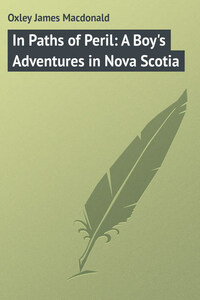"Give it to him, Terry – that's the style!" "Punch his head!" "Hit him in the face, Mike!" "Good for you, Terry – that was a daisy!" "Stick to him, me hearty; ye'll lick him yet!"
The shouts came from a ring of ragged, dirty youngsters, who were watching with intense excitement a hand-to-hand and foot-to-foot fight between two of their own kind – a rough-and-tumble affair of the most disorderly sort.
They were not well-matched combatants, the one called Terry being much inferior in size and weight to the other; but he evidently had the sympathy of the majority of the spectators, and he displayed an amount of vigour and agility that went far to make up for his deficiencies in other respects.
In point of fact, he was not fighting his own battle, but that of little Patsy Connors, whose paltry, yet to him precious, plaything had been brutally snatched away from him by Mike Hoolihan, and who had appealed to Terry to obtain its return.
The contest had waged but a few minutes, and the issue was still uncertain, when a shrill cry of, "The peelers! the peelers! they're comin' up the street!" caused a dispersion of the crowd, so speedy and so complete that the boys composing it seemed to vanish like spirits; and when the big blue-coated, silver-buttoned policemen reached the spot, there was nothing to arrest but a woebegone puppy, who regarded them with an expression that meant as plainly as possible, —
"Please, sirs, it wasn't me; and I don't know where they've gone to."
So the guardians of the peace were fain, after giving an indignant glance around, to retire in good order, but with empty hands.
*****
A life divided between Blind Alley and the Long Wharf could hardly have had a hopeful outlook. Blind Alley was the most miserable collection of tumble-down tenements in Halifax. It led off from the narrowest portion of Water Street, in between two forbidding rows of filthy, four-storied houses, nearly every window of which represented a family, and brought up suddenly against the grim and grimy walls of a brewery, whence issued from time to time the thick, oppressive vapours of steaming malt.
The open space between the rows of houses was little better than a gutter, through which you had to pick your way with careful steps if you did not wish to carry off upon your boots and clothing unsavoury reminders of the place.
Little wonder, then, that so soon as the children of Blind Alley were big enough to walk they hastened to desert their repulsive playground, in spite of the shrill summons back from their unkempt mothers, who, though they made no attempt to keep them clean, loved them too much to think with composure of their being exposed to the many dangers of busy, bustling Water Street.
It is safe to say that you could not peer into Blind Alley during any of the hours of daylight without hearing stout Mrs. M'Carthy, or red-haired Mrs. Hoolihan, or some other frowsy matron with no less powerful lungs, calling out from her window, —
"Patsy! Norah! where are ye now, ye little villains? Ye're the plague of my life wid yer always gettin' out of me sight. Come back wid ye now, or I'll beat the very life out o' ye."
And if the poor little urchins had not managed to get around the corner so as to be out of sight, they would slink dejectedly back to wait for a more favourable opportunity.
Terry Ahearn's home, if so sweet a name could rightly be given to such wretched quarters, was in the last house on the left-hand side, the two squalid rooms which served all the purposes of kitchen, parlour, and bedrooms being on the second floor, and right against the brewery wall. Here he had been born, and had grown up pretty much as the weeds grow – according to his own devices. Although the only survivor of several children, his father, who bore the unprepossessing nickname of "Black Mike," hardly ever noticed him, unless it was to swear at him or cuff him. When sober, Black Mike was sulky, and when drunk, quarrelsome, so that Terry had many excuses for not loving him. As most of Mike's earnings went over the bar at the Crown and Anchor, his wife was obliged to go out scrubbing in order to provide the bread and molasses which, with a few potatoes and an occasional bit of meat, formed the staple of Terry's diet.
With anything like a fair chance, poor Peggy Ahearn would have made a tolerably good mother. But her married life had been one long martyrdom, which had broken her spirit and soured her temper. She loved Terry with all her heart, and he loved her in return; yet an observer of their mutual relations might well have thought otherwise. He was very apt to be saucy to her if his father was not near, and she rarely addressed him in terms of affection or gentleness.
From such surroundings Terry, naturally enough, was only too glad to escape. Even the public school was more endurable, especially during the long cold winter. In the bright long days of summer there was the Long Wharf, on which his father worked, and where Terry's companions gathered every day, rain or shine, from the beginning of May to the end of October.












